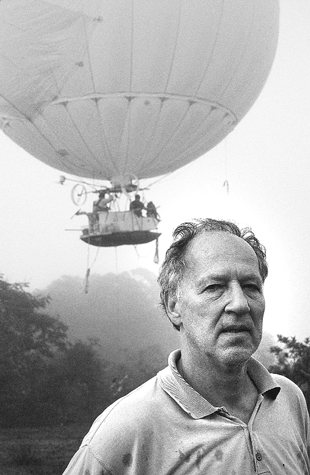German filmmaker indulges a flight buff’s determination to conquer the rain forest
German film director Werner Herzog may have been born in the wrong century to satisfy his filmmaking wanderlust. His romantic sensibility, tinged with a colonialist’s nostalgia, is unabashedly pre-globalization.
Always a globetrotter, he made his first feature in Greece, going on to work in Africa, Latin America (starting with his 1972 breakthrough, “Aguirre”) and Australia. His lengthy, eclectic body of work is mostly unknown in the U.S., but this summer three of his films are opening in New York.
At Film Forum, “Wheel of Time,” a documentary about Buddhism, will follow “The White Diamond.” In August, “Grizzly Man,” a portrait of an eccentric man obsessed with grizzly bears, will open. Additionally, his rarely-seen “Land of Silence and Darkness” is finally being released on DVD next month.
Less concerned with his country’s history than his New German Cinema counterparts Wim Wenders and Rainer Werner Fassbinder, Herzog now looks like the last man standing from that 1970s movement. Herzog has reversed course on the traditional directorial path of first filming documentaries before working on narrative features. His 2001 misfire “Invincible” suggested that he should stay away from fiction. It’s also a bit ironic that Herzog is now concentrating on documentaries, having been the subject of a fascinating one––Les Blank’s “Burden of Dreams,” about the troubled production of his 1982 “Fitzcarraldo.” General consensus holds that Blank’s film beats Herzog’s.
“The White Diamond” begins with footage of early aviation experiments, culminating in the development of the hydrogen-powered airship and the Hindenburg disaster. In London, Herzog meets Dr. Graham Dorrington who has tried reconstructing a functional airship, using a lighter, diamond-shaped design. Interested in studying the fauna of rain forest canopies, he goes to Guyana to test the dirigible. However, a deeper, more personal motive—returning to the site where he witnessed nature documentarian Dieter Plage plunge to his death—underlies his mission. Getting the airship to fly will help compensate for this loss.
Some of the images in “The White Diamond” recall American director James Benning’s experimental landscape portraits. Herzog could have made a fascinating film simply out of these images of the Guyanese rain forest and waterfalls. The countryside is varied, full of color, texture and nuance. Even mundane images look wonderfully strange—in extreme close-up, a harmless iguana resembles an alligator. Herzog narrates “The White Diamond”––in English––but knows when to vacate the frame and leave space for his subjects to speak.
Herzog’s eye for beauty has sometimes taken him to extremes or landed him in hot water. One of his best films, 1992’s “Lessons of Darkness,” about Kuwait’s hellish oil fires in the wake of Iraqi troops’ withdrawals in the first Persian Gulf war, is also one of his most controversial. A deeply disturbing cri de coeur about the human race’s destruction of the planet, it’s been criticized for commercializing the conflagrations while avoiding an overtly anti-war stance.
Herzog’s interest in colonialism––particularly in the southern half of the American hemisphere––sometimes risks repeating the worst behavior of Europeans. There’s something faintly patronizing about his treatment of worker Mark Anthony Yhap, an uneducated Rastafarian with an immense knowledge of medicinal plants and a pet rooster named Red Man. The film treats him as a noble savage whose lack of formal schooling makes his mastery of the jungle all the more credible.
The high points of “The White Diamond” suggest that if Herzog made a nature documentary along the lines of “Microcosmos” or “Winged Migration,” it might be a masterpiece. The film rambles, but its loose structure—with Dorrington’s lengthy recollection of Plage’s death coming fairly late—suits the expedition. Plage haunts the film subtly, in ways that gradually pay off. “The White Diamond” may exalt the quest for transcendence, but it’s all the more powerful for recognizing the inevitable failures and tragedies along the way.
gaycitynews.com



































